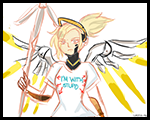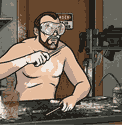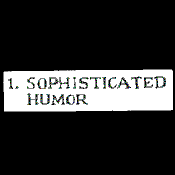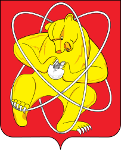|
I feel like Matterhorn would make a great movie if they did it similar to Platoon.
|
|
|
|

|
| # ? Apr 26, 2024 16:40 |
|
Well, all this talk has got me back into the Ryanverse...I'm up to Debt of Honor.
|
|
|
|
 Some essential poo poo right here.
|
|
|
|
When you were in the military, you were almost certainly asked to do some sort of stupid, pointless bullshit that you could tell wasn't going to accomplish a drat thing. You may have objected, only to be told that there was a bigger picture you couldn't see. Have you ever wondered what that bigger picture was, or if it actually existed? Are you a civilian who would like to taste the cynicism that warms the hindlobes of GiPpers brains? Do you have a good mood or some faith in your government you've grown bored with? If so, I recommend Imperial Life in the Emerald City and Little America by Rajiv Chandrasekaran. These are blow by blow books about how America squandered its opportunities in Iraq and Afghanistan. It's all there: Incompetent civilians, greedy contractors, and military leadership bound and determined to fight the war they want to fight rather than the one going on around them. Chandrasekaran is never melodramatic, he doesn't spend the book hitting the reader over the head with his personal theories about who is to blame or why, he simply lays out the record of failure in meticulous, even-handed detail. These books will break your heart, but you need to read them if you want to understand why the last decade has been such a clusterfuck for American foreign policy.
|
|
|
|
Dead Reckoning posted:If so, I recommend Imperial Life in the Emerald City and Little America by Rajiv Chandrasekaran. These are blow by blow books about how America squandered its opportunities in Iraq and Afghanistan. It's all there: Incompetent civilians, greedy contractors, and military leadership bound and determined to fight the war they want to fight rather than the one going on around them. Chandrasekaran is never melodramatic, he doesn't spend the book hitting the reader over the head with his personal theories about who is to blame or why, he simply lays out the record of failure in meticulous, even-handed detail. These books will break your heart, but you need to read them if you want to understand why the last decade has been such a clusterfuck for American foreign policy.
|
|
|
|
Have to second ghost bones' recommendation here.
|
|
|
|
In case you're looking for a good WWII book, Rick Atkinson's "The Guns at Last Light" is a great account of Operation Overlord and the Allied campaign through the end of the war. Be warned- the author has a very ostentatious vocabulary, and the profligate verbosity through which he dispenses the narrative is occasionally akin to fighting the dreaded Hun through the bocage.
|
|
|
|
suboptimal posted:In case you're looking for a good WWII book, Rick Atkinson's "The Guns at Last Light" is a great account of Operation Overlord and the Allied campaign through the end of the war. Be warned- the author has a very ostentatious vocabulary, and the profligate verbosity through which he dispenses the narrative is occasionally akin to fighting the dreaded Hun through the bocage. It's masturbatory horseshit if you ask me, and stuff that's largely ganked from better writers. Max Hastings' treatment of 1944-1945 in Armageddon: The Battle for Germany and Retribution: The Battle for Japan are infinitely better. I mean, who the gently caress describes an infantry assault as "gutful" except for Atkinson? I bought it only out of habit after reading the first two in the trilogy (not knowing much about the North African and Italian campaigns), but honestly, the third just feels like a re-tread that he knew he could make easy cash on. I haven't had a chance to read Hastings' book on D-Day, but I'm assuming it does more justice to it than Atkinson's "and then some French/British/Canadian/Polish soldiers did something, BACK TO 'MERKA  " treatment of the war in Western Europe. " treatment of the war in Western Europe.(Relevant Links) http://www.amazon.com/Armageddon-Germany-1944-1945-Max-Hastings/dp/0375714227/ref=sr_1_3?s=books&ie=UTF8&qid=1373596986&sr=1-3 http://www.amazon.com/Retribution-Battle-Japan-1944-45-Vintage/dp/0307275361/ref=pd_bxgy_b_img_y
|
|
|
|
I haven't read his other work, but I did very much enjoy his "long grey line"
|
|
|
|
Hebert McBride really seemed to thrive in trench warfare. The Western front from 1914 to 1916 was a theme park for him, between trench raiding and sniping. He comes across as one of those who flourish in warfare and are unable to cope with peacetime. Regardless, this book was one of the core texts in American sniper doctrine. http://www.amazon.com/gp/aw/d/1614271674/ref=redir_mdp_mobile
|
|
|
|
Re: Atkinson, I'm near the end of An Army at Dawn and just picked up The Day of Battle. I liked An Army at Dawn but I can understand where people see flaws. It's not particularly comprehensive and tends to focus on the personalities and human side of the campaign, which is not unexpected considering Atkinson's background (journalism). I'd say it's a readable introduction to the North African campaign and I would expect about the same from The Day of Battle regarding Sicily and Italy. Normandy and Operation Overlord have been covered way more in books and movies and so on, so I'm not surprised The Guns at Last Light doesn't stand out when you have stuff like Max Hastings' work around. I have Overlord on my Kindle, need to get to that sometime, I also picked up Das Reich a long time ago... I have too many history books on my to-read list  On a completely different topic, I'm about 3/4 through The Grand Strategy of the Roman Empire and it's pretty good, all sorts of details about how the Romans operated, constructed fortifications, etc. I also have The Grand Strategy of the Byzantine Empire to follow it up with. I enjoy books about how armies operate - my favorite book about Napoleon is still Swords Around a Throne. I've tried reading Adam Zamoyski's Napoleon books and can't seem to finish them. I got halfway through Rites of Peace (about the Congress of Vienna) and about 20% into Moscow: 1812 before they lost my attention.
|
|
|
|
keyrock posted:Hebert McBride really seemed to thrive in trench warfare. The Western front from 1914 to 1916 was a theme park for him, between trench raiding and sniping. Reflections of a Warrior:Six Years as a Green beret in Vietnam by Medal of Honor recipient Franklin Miller is similar, but about Vietnam obviously. He was one of those guys that thrived in warfare as well, and had difficulty transitioning to being in an Army at peace (he ended up staying in until 1992). Blows my mind that he spent 7 years in Vietnam and 6 of those in Special Forces and somehow didn't get killed, especially considering the types of missions he was on. Definitely an uncommon type of individual. http://www.amazon.com/Reflections-Warrior-Years-Green-Vietnam/dp/0743464990
|
|
|
|
So I got the Library to get some books in from across town: Adolf Hitler: My Part in His Downfall by Spike Milligan and Achtung Panzer! by Heinz Guderian. Both are books that were mentioned by people elsewhere on the forums. When I went to get them the Librarian says to me ' He's got a big ego, that Guderian, Von Manstein was the real genius. And they first used the word 'Blitzkreig' in 1942... '  Nice to know, I guess. Nice to know, I guess.
|
|
|
|
Panzer Commander is another book worth reading. http://www.amazon.com/Panzer-Commander-Memoirs-Colonel-Hans/dp/0440208025
|
|
|
|
|
Jaguars! posted:So I got the Library to get some books in from across town: The Germans didn't coin the term "blitzkreig" as we associate it with the invasion of Poland, but it was definitely in use prior to 1942. It was used in a 1939 issue of Time Magazine, and probably before that since Time doesn't seem to have invented it either. I'd recommend Manstein's book Lost Victories as well. I've got a 27-page paper on the development of blitzkreig as an operational concept. Some of the better sources I had were Achtung Panzer, The Roots of Blitzkreig by James Corum, Guderian: Creator of the Blitzkreig by Kenneth Macksey (this guy seriously sucks Guderian's dick), and anything you can find on Hans von Seekt...this guy is the reason Germany was able to rebuild so effectively despite the pressures the Allies dumped on it. Edit: After some quick reading through of articles I saved on the topic, it seems blitzkreig was used on several occasions by German military writers/strategists throughout the interwar period, as early as the 20s. But it was generally used as a description (it means "lightning war") rather than a name or title of anything specific. It was used to describe such things as the sudden onset of combat, or as a "knockout blow." So it's likely the term was just applied to a situation that fit the description, and stuck as a name. But the West applied that name first, then the Germans were like "Yeah, that sounds badass. We'll use it too." Godholio fucked around with this message at 16:33 on Jul 31, 2013 |
|
|
|
Review: Adolf Hitler - My Part in his Downfall by Spike Milligan More Accurate title: Comedian Recounts Best jokes and Lays of his war years.  Many of you may not know of Spike Milligan, at one time a major figure in British comedy. He was a comedan known for his 1950s radio series 'The goon show' and later the TV show "Q", and generally being the immediate predecessor of the Monty Python brand of absurdist comedy. Oddly enough, in my country these days his largest legacy is probably childrens book "Badjelly the Witch" Anyway, on to the book. Milligan published his memoirs in five parts, of which this was the first. It covered the period from the outbreak of war until shortly before his first combat in North Africa in early 1943. At 146 pages it makes for a pretty slim volume and a short read. Milligan was conscripted shortly after the outbreak of the war and ended up in the 56th Heavy Regiment, Royal Artillery. This volume mostly consists of his training and impressions of the personnel and general hosed-up organisation that I think all serviceman would recognise. Milligan is not exactly the most reliable narrator; The preface states that 'All the salient facts are true, I have garnished some of them in my own manner, but the basic facts are, as I say, true.' and while often veering into absurdity, sometimes it's hard to tell where the truth begins. It's a bit like listening to your mate recounting how he got laid at a party last weekend; you have to take it all with a grain of salt. Also stated in the preface, Milligan said 'I never thought that an organisation like ours could ever go to war, let alone win it.' The unit is billetted in a requisitioned Girls school. It has no AA defence until a Spandau is appropriated from a crashed Dorner. They use 9.2" Howitzers left over from the first war but they have no ammo, so they shout bang in unison instead. The Cook keeps a pig (Painted as a dog because pigs are not allowed in barracks) and they have to retreive it after it gets loose in a retirement home. They listen the guns at Dunkirk and see the first raids on London are are able to do absolutely nothing about either. A piss bucket gradually rots out a floor and one night falls through onto the officer sleeping below. The weird thing is that despite being in the largest war the world has ever seen they effectively were in garrison for 3 years.  They had to order it in specially... Gradually the unit becomes effective. They recieve working howitzers. 'Leather Suitcase', his first CO is one of many hopeless leftovers relieved when Montgomery takes over the area. Milligan becomes a signaller, patching officer's private phonecalls through to friends in far flung OPs. He forms a jazz band (having worked as a musician before the war) and plays in the local halls. A large part of the book is recounting drunken or bored shennanagans, as well as what is probably every snarky comment or neat riposte that he heard during the war. He also recalls the various girls he seduces (And a few strikeouts); "It was all sex in those days - It was that or the 'flicks' and the flicks cost money. There was a lovely busty girl called Beryl..."   Lots of cartoons throughout, he was well known for silly drawings like these To Military-type readers a lot of the routine will be familiar - I still have FSMO (Field service marching order) and have visited a NAAFI(Don't even know what this means, in my experience it's a Q-store shop.) Training stupidities, getting lost on exercise, selling gear, labour for superior officers and other small corruptions. I had a few strange moments of recognition reaching out from nearly 80 years ago. Those used to the image of the pre-sixties world as prim and proper will be surprised by the amount of swearing, ("This is the latest style from America, Cab Calloway wears it" "He must be a oval office") sex, and a barracks showman forming 'The last turkey in the shop', 'Sack of Flour' and 'The Roaring of the Lions' after lights-out using his genitals.   Milligan writes in a clear, concise manner, his post-war career was based on sending up authority and thus his writing has no pretensions at all. It's lighthearted with some poignant touches and he is constantly plays around with writing and speech conventions; I found this book a pleasure to read. Score: 8/10, Interesting picture of the phony war period and in non-combat WWII life. 10/10 if you're a fan of cheesy old britcomedy. Militaryness of Author: 3.4 Kilogrovers out of 10, Strongly anti-authoritarian streak, ran out of Heart on a five mile run. E: various Jaguars! fucked around with this message at 08:16 on Aug 21, 2013 |
|
|
|
Book club sitrep...what's everybody reading?
|
|
|
|
dicks
|
|
|
|
im really plowing through this tome full of hard truths and sick wisdom but im sure its nothing you havent already read
|
|
|
|
Elendil004 posted:sitrep 
|
|
|
|
ghost bones posted:im really plowing through this tome full of hard truths and sick wisdom but im sure its nothing you havent already read You'd think that if they were trying to look operator as gently caress, they wouldn't take such an awful picture for the cover...but then again that's pretty good for the airsoft community. Anyways, I'm currently plodding through Shattered Sword: The Untold Story of the Battle of Midway, on recommendations from this thread. Very interesting, but very dry account of what went right/wrong on the Japanese end of things to make the WWII Battle of Midway go down the way it did. Really cool insights into the minds of the Japanese high command too, and you can really see how the culture they had really hosed them, tactically.
|
|
|
|
I recently read Fiasco by Tom Ricks and wasn't a fan. There is some interesting stuff in there since he talked to a lot of higher up dudes but most of it is old news these days. He also uses unnamed sources quite a bit which, necessary or not, hurts the legitimacy of the book imo. My biggest problem with the book is how he verbally strokes Petraeus throughout the whole thing and claims that Mosul only went to poo poo because the 101st left and follow on units weren't big enough to control the city. More dudes would have been great but, based on studies I've read, insurgent attacks in Mosul were steadily increasing throughout 2003 while the 101st was still there and then into 2004 when the city went nuts and motherfuckers started blowing up police stations. I give this book a 2 out of 5. I'm also reading quite a bit about German anti-partisan actions in the Eastern Theater and some stuff on the British involvement in Iraq in the 20th century for some papers I'm writing. I'll make a post later on with any good books I come across.
|
|
|
|
RichieHimself posted:I recently read Fiasco by Tom Ricks and wasn't a fan. There is some interesting stuff in there since he talked to a lot of higher up dudes but most of it is old news these days. He also uses unnamed sources quite a bit which, necessary or not, hurts the legitimacy of the book imo. My biggest problem with the book is how he verbally strokes Petraeus throughout the whole thing and claims that Mosul only went to poo poo because the 101st left and follow on units weren't big enough to control the city. More dudes would have been great but, based on studies I've read, insurgent attacks in Mosul were steadily increasing throughout 2003 while the 101st was still there and then into 2004 when the city went nuts and motherfuckers started blowing up police stations. I give this book a 2 out of 5. I got about 2/3 through The Generals before I lost interest. It was an ok book but I just couldn't get through to the end. I haven't read any of Tom Ricks' other books, although I do enjoy his blog (The Best Defense) - there are some pretty good commenters on there.
|
|
|
|
I just read a bunch of Laird Barron stuff. Mostly cosmic horror type stuff in the Lovecraftian vein. Very  kind of stuff. Look up his short story "Hallucigenia" for something to read alone on a dark night. kind of stuff. Look up his short story "Hallucigenia" for something to read alone on a dark night.
|
|
|
|
The Great War spawned the largest and most detailed wealth of literature (both factual and fictional) in the history of war, so it's a tad daunting trying to recommend highlights, but on the plus side, there's no shortage of resources to recommend to anyone interested in learning more about it. I'd agree with all the books recommended so far, but would like to add a few that I haven't seen mentioned yet. In terms of general books about the war, Undertones of War the autobiography by Edmund Blunden stands up well beside Ernst Junger's Storm of Steel (previously mentioned in the thread), as does Memoirs of an Infantry Officer the fictionalised autobiography of Siegfried Sassoon (although by the time he wrote this, he may have become rather more anti-war than some in this thread can stomach). For those who are actively serving, or have in the past, I would expect The War the Infantry Knew: 1914-1919 A Chronicle of Service in France and Belgium by Captain J.C. Dunn might hit the spot. Adding to the works already recommended about the Somme battle in particular, I'd also suggest The First Day on the Somme: 1 July 1916 by Martin Middlebrook, Bloody Victory by William Philpott, and for the reverse perspective Through German Eyes: The British and the Somme 1916 by Christopher Duffy. No Man's Land: The Story of 1918 by John Toland and 1918: A very British victory by Peter Hart, are both excellent synopses of the last, decisive, (and arguably most interesting) year of the war. One excellent WW2 book (especially if you're interested in the aviation side of things), which I don't remember seeing mentioned, is First Light by Geoffrey Wellum. And finally, I've read and enjoyed many of the Vietnam books mentioned by previous posters, but haven't seen anyone suggest the book which was almost certainly my "gateway book" into an interest in military history .. Dispatches by Michael Herr.
|
|
|
|
Dispatches was a great read.
|
|
|
|
Elendil004 posted:Dispatches was a great read. It really was. I think I've read it like a dozen times. It's really striking how, being essentially trained as a journalist, Herr manages to achieve this incredible economy of words, being able to cram a ton of memorable emotion and sensation into what is really a pretty tiny book. I've not really come across anyone else who can encapsulate in such a vivid way just how weird and confusing and terrifying and just horrible that war must have been for a lot of the soldiers who were there. Other authors bang on for whole chapters trying to explain how alienating an environment it could be, and how from out of nowhere things would just happen which you couldn't explain, and which gave you no clues that you could build into a frame of reference for "keeping yourself safe". Herr on the other hand just relates a story from some forward base where he's chatting to a tired, dead-eyed grunt .. and the guy sums it up in the briefest of sentences .. "Patrol went up the mountain. One guy made it back, but he died before he could tell us what happened". Yeah.
|
|
|
|
I was catching up with the thread and saw the talk about The Last Ship. Turns out the kindle version will be available next month on Amazon for $7.99. I guess it's because of the tv miniseries coming out soon.
|
|
|
|
 "In 1812: The Navy’s War, prizewinning historian George C. Daughan tells the thrilling story of how a handful of heroic captains and their stalwart crews overcame spectacular odds to lead the country to victory against the world’s greatest imperial power. A stunning contribution to military and national history, 1812: The Navy’s War is the first complete account of how the U.S. Navy rescued the fledgling nation and secured America’s future." It was on the Navy's reading list, and one of the few books that was actually very enjoyable (they took all electronics off submarines 2 weeks before my deployment; we were fighting over this poo poo). TBF, I hadn't really studied the war of 1812 before, so much of the material was novel to me, but still a good read.
|
|
|
|
So his theory is that the War of 1812 was a big win for the US? That's interesting.
|
|
|
|
napoleon was just a sideshow to the war of 1812 for britain
|
|
|
|
Godholio posted:So his theory is that the War of 1812 was a big win for the US? That's interesting. Well, the book does talk about Britain's plan to carve up the Union, so it could be said that the outcome that got forced was better than the outcome that could have resulted had Britain performed better, and that outcome was forced primarily by a fledgling Navy, and was done in spite of Congress's and Madison's refusal to actually fund that Navy. I think the big lesson is that, in the War of 1812, each side's biggest ally was mostly the ubiquitous incompetence of their opponents. And Native Americans lose their last chance at their own nation pretty much as a forgotten speed bump.
|
|
|
|
Sacrilage posted:(they took all electronics off submarines 2 weeks before my deployment; we were fighting over this poo poo).
|
|
|
|
piL posted:had Britain performed better, and that outcome was forced primarily by a fledgling Navy it's almost as if britain was preoccupied by something else going on at the time... another war perhaps...
|
|
|
|
friend of the family DEATH TURBO posted:it's almost as if britain was preoccupied by something else going on at the time... another war perhaps... I'm not certain what it is you're trying to express.
|
|
|
|
piL posted:I'm not certain what it is you're trying to express. Starts with N, ends in apoleon. (The War of 1812 was a quaint sideshow to the British Empire, mostly because they were otherwise occupied trying to prevent a tyrant from taking over all of Europe.)
|
|
|
|
I'm sorry, I wasn't being honest there. I was aware of Napolean. But why NDT's attempt to inform me of this massively world-shaping event was a response to me explaining how the War of 1812 was an important point in American history and why the book talks about it being a 'win' for the US Navy--that's the part I'm struggling to grasp. I'm talking about reading a book about the War of 1812; why does someone think I can somehow actually be unaware of Napolean?
|
|
|
|
Because Britain never tried to actually win. The official issues of impressment and other naval abuses by the Brits against Americans were weak justifications for the declaration of war...the idea that it was an excuse to annex Canada and expel Britain from North America fits the evidence and the Americans' emphasis on a northbound land campaign much better. American naval hit-and-tactics served them well, but only because the Royal Navy treated that theater as the sideshow it was and only dispatched enough ships to keep the USN busy. I'm actually interested in reading this book, now. Edit: the War of 1812 was a push, not a win. The American land campaign was a complete disaster, and the naval campaign actually accomplished nothing of value. The British Acts that America was outraged about were actually already repealed before Congress declared war, but the news was still crossing the Atlantic. The Americans got what they wanted without firing a shot, but because *reasons* they decided to invade Canada rather than cease hostilities. If it weren't for the continental war in Europe and the global naval campaign Britain was already fighting, the Americans would have been fighting against a British reconquest. Godholio fucked around with this message at 18:43 on Sep 29, 2013 |
|
|
|
The way the book ends up presenting it, after Napolean's abdication, it's only American naval victories in the Atlantic and the Great Lakes that basically prevented catastrophic territory losses in America. When viewed as a war purely made out of American aggression, you're completely right. But the book certainly colored my view of impressment as an issue (which Liverpool did not do anything about when he repealed trade restrictions on America if I remember correctly). Impressment combined with trade restrictions and a refusal to engage in meaningful diplomacy shows a fault that's at least now wholly American for the hostilities. You're right that calling it an American victory is too strong of language. But resisting British Imperial will to submit to trade restrictions and the employment of Americans via imprisonment and force, and not being utterly annihilated or even having to make any appreciable concessions after the war in Europe has ceased and the British were able and willing to devote much more of their forces to that war is something. I certainly don't have the linguistic finesse to describe in a single phrase, however. I liked that (ignoring that blurb) the book doesn't try to give the impression that America was some unstoppable British-killing force, but rather a bumbling mess resisting the political will of a force that was also rather bumbling (primarily because it was focusing on maintaining a world-spanning trade empire while simultaneously fighting a massive campaign in Europe). And just-in-time for Britain to focus on punishing America for its refusal to submit, Americans started shaping up to actually put up a fight when that time came. And as a result, America's need for a navy was proven, a political movement was marginalized and (most strangely) the British and Americans were basically bestest buds.
|
|
|
|

|
| # ? Apr 26, 2024 16:40 |
|
Godholio posted:So his theory is that the War of 1812 was a big win for the US? That's interesting. The war of 1812 was a win for the navy. Back when, there were strong feelings about standing armies and such. The opposite tradition was the militia on the village green and all that, but you couldn't exactly muster a frigate on the village green*. Warships required a huge amount capital and manpower to sustain. Once the war broke out, the navy validated its own existence. *though you could build competing flotillas on the opposite sides of a lake like at the Battle of Plattsburgh http://en.wikipedia.org/wiki/Battle_of_Plattsburgh
|
|
|

























